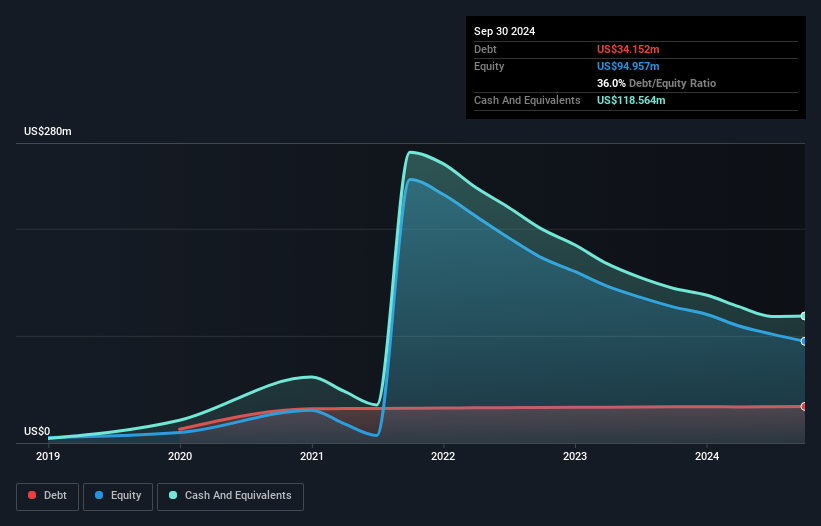
Warren Buffett famously said, 'Volatility is far from synonymous with risk.' So it might be obvious that you need to consider debt, when you think about how risky any given stock is, because too much debt can sink a company. We can see that Sight Sciences, Inc. (NASDAQ:SGHT) does use debt in its business. But should shareholders be worried about its use of debt?
Why Does Debt Bring Risk?
Generally speaking, debt only becomes a real problem when a company can't easily pay it off, either by raising capital or with its own cash flow. In the worst case scenario, a company can go bankrupt if it cannot pay its creditors. However, a more usual (but still expensive) situation is where a company must dilute shareholders at a cheap share price simply to get debt under control. Having said that, the most common situation is where a company manages its debt reasonably well - and to its own advantage. When we think about a company's use of debt, we first look at cash and debt together.
See our latest analysis for Sight Sciences
What Is Sight Sciences's Net Debt?
As you can see below, Sight Sciences had US$34.2m of debt, at September 2024, which is about the same as the year before. You can click the chart for greater detail. However, its balance sheet shows it holds US$118.6m in cash, so it actually has US$84.4m net cash.

How Healthy Is Sight Sciences' Balance Sheet?
According to the last reported balance sheet, Sight Sciences had liabilities of US$13.8m due within 12 months, and liabilities of US$34.8m due beyond 12 months. Offsetting these obligations, it had cash of US$118.6m as well as receivables valued at US$12.9m due within 12 months. So it can boast US$82.9m more liquid assets than total liabilities.
This luscious liquidity implies that Sight Sciences' balance sheet is sturdy like a giant sequoia tree. Having regard to this fact, we think its balance sheet is as strong as an ox. Simply put, the fact that Sight Sciences has more cash than debt is arguably a good indication that it can manage its debt safely. The balance sheet is clearly the area to focus on when you are analysing debt. But it is future earnings, more than anything, that will determine Sight Sciences's ability to maintain a healthy balance sheet going forward. So if you want to see what the professionals think, you might find this free report on analyst profit forecasts to be interesting.
In the last year Sight Sciences had a loss before interest and tax, and actually shrunk its revenue by 4.0%, to US$80m. We would much prefer see growth.
So How Risky Is Sight Sciences?
By their very nature companies that are losing money are more risky than those with a long history of profitability. And we do note that Sight Sciences had an earnings before interest and tax (EBIT) loss, over the last year. And over the same period it saw negative free cash outflow of US$26m and booked a US$50m accounting loss. But the saving grace is the US$84.4m on the balance sheet. That kitty means the company can keep spending for growth for at least two years, at current rates. Even though its balance sheet seems sufficiently liquid, debt always makes us a little nervous if a company doesn't produce free cash flow regularly. The balance sheet is clearly the area to focus on when you are analysing debt. However, not all investment risk resides within the balance sheet - far from it. For example - Sight Sciences has 2 warning signs we think you should be aware of.
If, after all that, you're more interested in a fast growing company with a rock-solid balance sheet, then check out our list of net cash growth stocks without delay.
New: Manage All Your Stock Portfolios in One Place
We've created the ultimate portfolio companion for stock investors, and it's free.
• Connect an unlimited number of Portfolios and see your total in one currency
• Be alerted to new Warning Signs or Risks via email or mobile
• Track the Fair Value of your stocks
Have feedback on this article? Concerned about the content? Get in touch with us directly. Alternatively, email editorial-team (at) simplywallst.com.
This article by Simply Wall St is general in nature. We provide commentary based on historical data and analyst forecasts only using an unbiased methodology and our articles are not intended to be financial advice. It does not constitute a recommendation to buy or sell any stock, and does not take account of your objectives, or your financial situation. We aim to bring you long-term focused analysis driven by fundamental data. Note that our analysis may not factor in the latest price-sensitive company announcements or qualitative material. Simply Wall St has no position in any stocks mentioned.
About NasdaqGS:SGHT
Sight Sciences
An ophthalmic medical device company, focuses on the development and commercialization of surgical and nonsurgical technologies for the treatment of eye prevalent diseases.
Flawless balance sheet and slightly overvalued.
Similar Companies
Market Insights
Community Narratives



